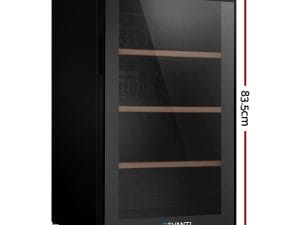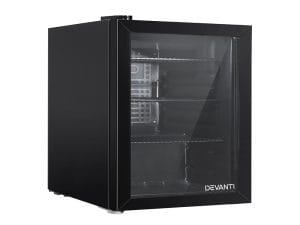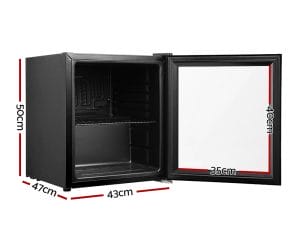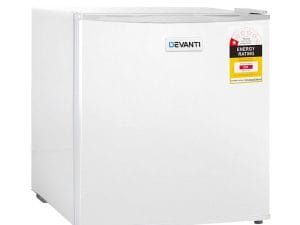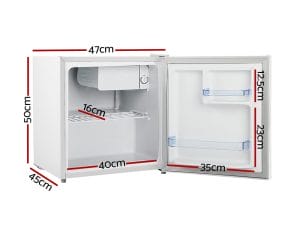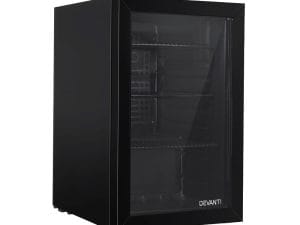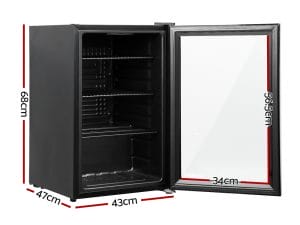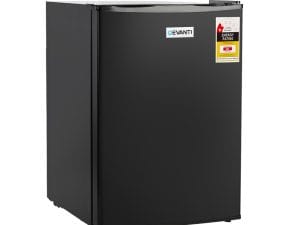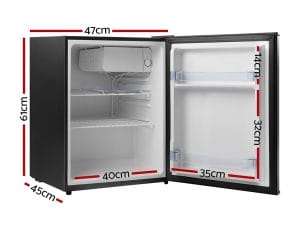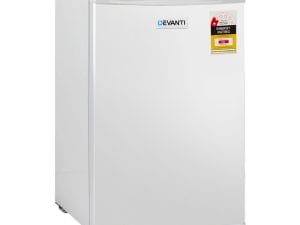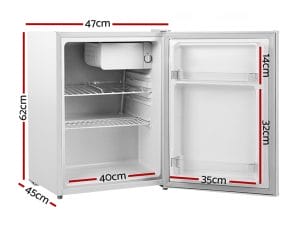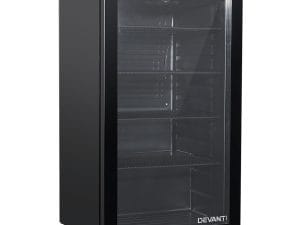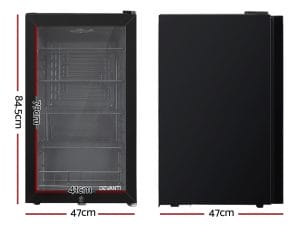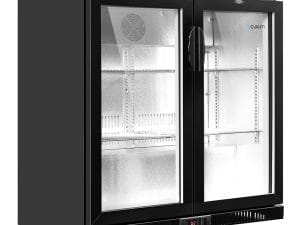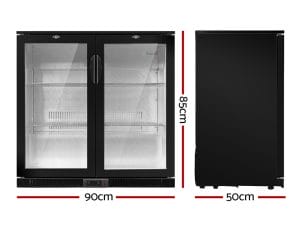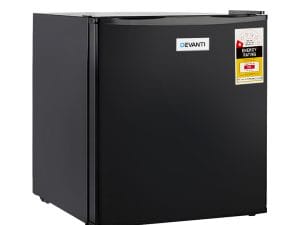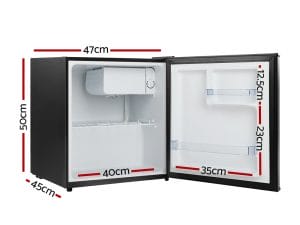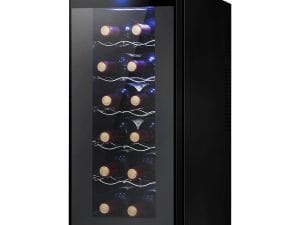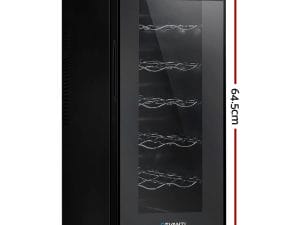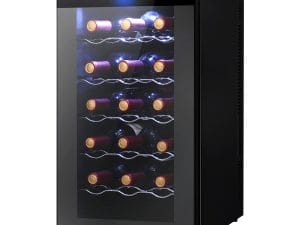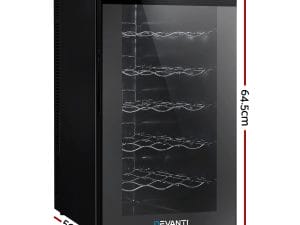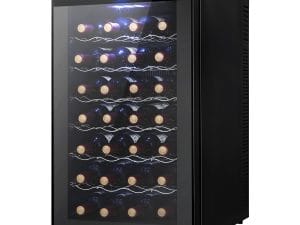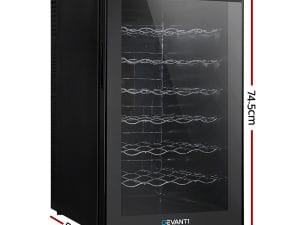Showing 1–12 of 28 results
-
Devanti 34 Bottles Wine Cooler Compressor Chiller Beverage Fridge
Original price was: $767.18.$422.36Current price is: $422.36.Add to cart -
Devanti 46L Glass Door Bar Fridge Mini Countertop Freezer Fridges Bottle Cooler
Original price was: $524.29.$313.05Current price is: $313.05.Add to cart -
Devanti 48L Portable Mini Bar Fridge – White
Original price was: $422.64.$201.67Current price is: $201.67.Add to cart -
Devanti 70L Bar Fridge Glass Door Mini Countertop Freezer Fridges Bottle Cooler
Original price was: $759.69.$432.98Current price is: $432.98.Add to cart -
Devanti 70L Portable Mini Bar Fridge – Black
Original price was: $553.18.$270.60Current price is: $270.60.Add to cart -
Devanti 70L Portable Mini Bar Fridge – White
Original price was: $553.18.$270.60Current price is: $270.60.Add to cart -
Devanti 98L Bar Fridge Glass Door Mini Freezer Fridges Countertop Beverage Commercial
Original price was: $999.37.$468.11Current price is: $468.11.Add to cart -
Devanti Bar Fridge 2 Glass Door Commercial Display Freeer Drink Beverage Cooler Black
Original price was: $1,746.23.$919.03Current price is: $919.03.Add to cart -
Devanti Bar Fridge 48L – Black
Original price was: $422.64.$249.37Current price is: $249.37.Add to cart -
Devanti Wine Cooler 12 Bottle Thermoelectric Fridge Storage Chiller
Original price was: $374.49.$244.12Current price is: $244.12.Add to cart -
Devanti Wine Cooler 18 Bottles Glass Door Beverage Cooler Thermoelectric Fridge Black
Original price was: $464.37.$286.58Current price is: $286.58.Add to cart -
Devanti Wine Cooler 28 Bottles Glass Door Beverage Cooler Thermoelectric Fridge Black
Original price was: $678.37.$288.07Current price is: $288.07.Add to cart
Tips for Maintaining Your Refrigerator to Keep It in Top Condition
Your refrigerator is without a doubt one of the most important home appliances. It puts in a lot of effort to keep your food and drinks cold and fresh. To guarantee it continues to operate smoothly and effectively, your fridge needs routine care and maintenance, just like any other machine. Neglecting your refrigerator can result in decreased performance, higher energy usage, and expensive repairs. To keep your refrigerator in great condition, this blog will explore some helpful maintenance advice.
1. Clean the Interior Regularly
Spills, crumbs, and food remnants can quickly build up inside your refrigerator. Cleaning the interior regularly not only keeps it smelling good but also stops mold and germs from growing. What you ought to do is:
- Unplug your refrigerator and empty it: To prevent any mishaps, unplug the refrigerator or shut off the power before cleaning.
- Remove all of the content: Remove every food item, shelf, and drawer.
- Shelves and drawers should be completely rinsed after being cleaned with warm, soapy water.
- Interior surfaces should be cleaned by wiping them down with a combination of water and vinegar in equal parts.
- Check for expired or spoiled food, and replace it: Use this chance to inspect your pantry for any expired or spoiled food products.
2. Maintain Proper Temperature
For food safety and refrigerator effectiveness, a stable and suitable temperature is essential. Aim to maintain the freezer at 0°F (-18°C) and the refrigerator between 35°F (2°C) and 38°F (3°C).
- Take the temperature: To guarantee that your refrigerator maintains the proper temperature, place a thermometer inside. The parameters can be changed if necessary.
- Keep doors closed: Keep the doors shut The temperature will rise if the refrigerator door is left open for a prolonged amount of time.
3. Clean the Condenser Coils
Heat from the refrigerator is released through the condenser coils. They may accumulate dust and debris over time, which reduces their effectiveness at dissipating heat.
- Identify the coils: To identify the condenser coils’ location (which is typically behind or beneath the refrigerator), consult your owner’s handbook.
- Turn off the power: Unplug the refrigerator or the circuit breaker to turn off the power.
- Clean the coils: Coils should be cleaned by using a brush or hoover to get rid of any debris. Be gentle so as not to harm the coils.
4. Check the Door Seals
To stop warm air from entering and cold air from escaping, the refrigerator doors must have a tight seal. Energy loss can result from worn or damaged seals.
- Examine the seals: Check the rubber door gaskets for rips, tears, or other signs of wear.
- Test the seal: Close the door after placing a piece of paper or a dollar bill in the door frame. If it is simple to remove, the seal might need to be replaced.
- Clean the seals: Seals should be cleaned by giving the door gaskets a warm, soapy water wipe to get rid of any dirt.
5. Defrost the Freezer
To maintain the effectiveness of a manual-defrost freezer, built-up ice must be taken out.
- Deactivate the freezer: Use a hairdryer to hasten the process of defrosting or unplug the freezer and let it thaw naturally.
- Remove Extra ice: After the ice has melted, use a cloth or sponge to wipe up any water and ice chunks that are still present.
- Clean the interior: Wipe clean the interior of the freezer to get rid of any moisture or residue.
6. Keep the Fridge Well-Stocked
A filled refrigerator often does a better job of keeping its temperature constant than one that is empty. When you open the door, the temperature is stabilized by the mass of the stored items.
- Fill and arrange the refrigerator: To increase the effectiveness of your refrigerator, keep it well-organized and filled with food.
7. Check for Leaks
Regularly check your refrigerator for any water or refrigerant leaks, which, if ignored, can cause major issues.
- If your refrigerator contains an ice maker or a water dispenser, check the water line for leaks or drips.
- Look for refrigerant leaks: If you detect a chemical smell or an oily residue, get in touch with a qualified technician right away.
8. Schedule Professional Maintenance
Even though the majority of refrigerator maintenance jobs may be done by you, it’s a good idea to plan annual or biannual professional maintenance. Before they develop into significant issues, a competent technician can spot and fix possible problems.
Conclusion
You can increase the lifespan of your refrigerator, increase its energy efficiency, and guarantee that your food stays fresher for longer according to these refrigerator maintenance recommendations. By reducing energy usage, routine maintenance not only saves you money on repairs but also lowers your carbon footprint. If you take good care of your refrigerator, it will last for many years while still keeping your food and drinks cool.
Visit DealDay’s refrigerator category for a huge selection of high-quality refrigerators. Find the ideal refrigerator for your requirements by selecting from a variety of brands and designs. To reap the rewards of your new appliance for many years to come, remember to follow these maintenance guidelines!


